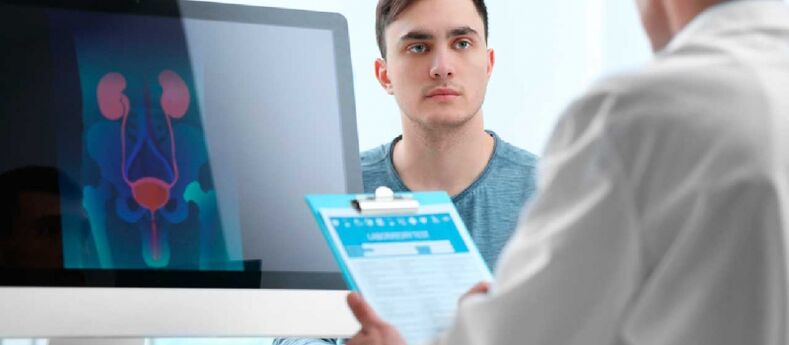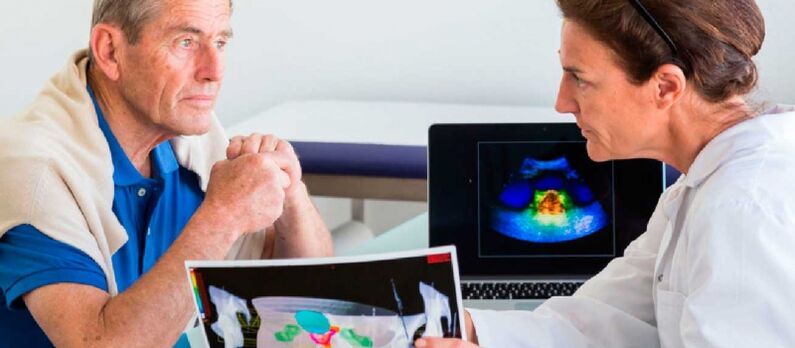Prostatitis is usually called an inflammatory process that develops in the prostate in men. This disease has unpleasant symptoms and is fraught with complications, one of which is infertility. So, what is prostatitis and how dangerous is the disease for the health of the male genitourinary system? With these questions, it is recommended to contact a urologist. This doctor will tell you exactly why prostatitis occurs, what type of disease prostatitis is, and how to properly treat it.
The lack of timely medical care causes the inflammation to transition into a chronic form. With symptoms of prostate disease, treatment should be started without delay. Otherwise, the infection can cause dangerous consequences, including tissue hyperplasia. As it is extremely difficult to cure acute prostatitis on your own, contact a urologist immediately. With an unfavorable course, the disease causes inflammation of the testicles, appendages, kidney structures.
reasons for development
Among modern men, prostate damage is not uncommon. Today it is diagnosed as an independent disease and as one of the symptoms of urological disorders - urethritis, prostate adenoma, cancer, kidney pathologies.
The causes of prostatitis are usually associated with the action of infectious agents and predisposing factors. Inflammation is caused by staphylococci, E. coli, enterococci, and other common pathogens. It is extremely important to establish the causes of the disease in the inflammation of the prostate so that an effective drug therapy can be selected.
Groups of risk

At risk are people with weakened immune systems, sexually transmitted diseases, injuries to the genitourinary organs and a habit of holding back urination. Not all men know why prostatitis is dangerous, what it is and what factors can trigger the development of the disease. A frivolous attitude to health often leads to a prolonged course of the inflammatory process. The educational work of urologists helps to form a correct idea about a disease like prostatitis and its possible consequences.
predisposing factors
Urologists pay special attention to the probable causes of prostatitis: treatment will be much more effective if the main predisposing factors are influenced. This will help to significantly reduce the risk of periodic exacerbation of the inflammatory process.
Possible causes of prostate disease:
- exacerbation of kidney disease;
- lesions of Organs genitourinary organs;
- hypothermia;
- increased exposure to radiation in the body;
- spread of infection from other pelvic organs;
- violations of the usual rhythm of sexual activity;
- long stay in the sitting position;
- compression of the genitals with tight underwear, pants and jeans;
- development of urological diseases, infection with venereal infections;
- chronic stress;
- general suppression of the immune system.
If you develop prostatitis, the causes of the condition must be determined by a qualified specialist. First of all, you need to contact a urologist. He will perform an exam and prescribe a comprehensive exam.
Blood stasis as the main cause of prostatitis
Effective treatment of prostatitis at home is impossible without eliminating the factors that cause stagnant processes in the pelvis. Violation of blood flow causes peroxidation of fats, release of exudative fluid, appearance of internal swelling of gland tissues. This creates favorable conditions for the active reproduction of pathogenic microorganisms. Having discovered the probable causes of inflammation, you can understand how to cure prostatitis at home without the disease turning into a dangerous chronic form.
diagnostic methods
To understand how to treat prostatitis in a particular man, it is necessary to carry out a diagnosis. Only then can you select certain drugs and techniques. Based on the results of laboratory and instrumental studies, the urologist can determine how to treat prostatitis for a man and how to prevent relapses in the future.
The main diagnostic methods for prostate inflammation:
- determination of blood PSA level;
- Prostate ultrasound;
- laboratory diagnosis of blood, urine;
- ureteroscopy;
- cystoscopy;
- rectal examination of the gland;
- urodynamic studies (cystometry, profilometry, uroflowmetry).
Comprehensive diagnosis helps to quickly select an effective treatment for prostatitis at home, prescribe drugs aimed at destroying a specific infectious agent.
PSA test
The PSA test helps not only to detect cancerous processes in the gland, but also to monitor the effectiveness of treatment for already diagnosed tumors and prostate inflammation. The method allows you to increase the effectiveness of therapy and reduce the risk of complications.
Thus, PSA screening, although it is a rather controversial type of early diagnosis of prostate cancer, in most cases allows the initiation of treatment in time, which is undoubtedly very important for a person with a chronic course of inflammatory processes and hyperplastic.
In combination with other diagnostic methods that rule out false results from a prostate screening test, PSA testing is a high-quality way to prevent cancer and monitor ongoing therapy. If multiple positive results are repeated, prostate tissue is removed for further biological testing.
disease symptoms
Prostatitis in men can have a variety of symptoms, depending on the stage of the disease. The acute form of the disease most often appears against the background of an infection in Organs pelvic organs and proceeds relatively easily, without symptoms of intoxication and fever. If these signs of prostatitis appear in men, you should immediately contact a urologist to start therapy in a timely manner and avoid the development of complications.
Acute prostatitis is characterized by the following symptoms:
- frequent and painful urination;
- pain in the sacrum, genitals and perineum;
- pain syndrome increases during defecation, sexual intimacy;
- body temperature rises;
- there is a feeling of a full bladder and its partial emptying (due to compression of the ureter by the inflamed prostate);
- intoxication intensifies, muscle and joint pain appear;
- urinary retention is possible.

If you have one or more likely signs of prostate inflammation, contact a specialist. Even if the state of health is satisfactory, the pathological process can proceed with faint signs, but at the same time cause complications.
The course of chronic prostatitis
The chronic inflammatory process is able to proceed almost asymptomatically. Men may experience minor pain when urinating, mild lethargy, chronic fatigue syndrome, and sexual dysfunction.
Men observe the following pathological signs (depending on the form and stage of the inflammatory process):
- pain when urinating;
- partial or complete retention of urine;
- pain in the sacrum, perineum;
- increase in body temperature;
- severe weakness, impaired performance;
- painful defecation;
- decreased libido, impotence.
The dim image of the chronic form of the disease deceives the patient and delays the visit to the urologist, and the delay is fraught with complications: swelling of the prostate, acute urinary retention, prostate abscess, inflammation of the testes and seminal vesicles , which often leads to irreversible male infertility.
Clinical manifestations of prostate inflammation vary depending on the stage of the disease. If the process develops for the first time, patients experience severe malaise, pain in the pubis and perineum, complain of painful and frequent urination. Body temperature may rise and pus may be released from the urethra. In the absence of medical care, the pathological process can be complicated by sepsis, purulent prostate abscess, vesiculitis, inflammation of the testes and their adnexa (epididymo-orchitis).
Prostatitis treatment
Prostatitis is being treated at home. Hospitalization is indicated for purulent complications and severe intoxication syndrome. Specialists prescribe antibiotics (taking into account sensitivity), carry out anti-inflammatory therapy. After the acute process has disappeared, physiotherapy and prostate massage are prescribed.
Since it is possible to treat prostatitis at home only after consulting a doctor, no folk remedies and methods can be used without the permission of a urologist. Unconventional methods are especially dangerous in severe cases of the disease. Home treatment of prostatitis can lead to the transition of the pathology to a chronic recurrent form.
medical therapy
How to effectively cure prostatitis with drugs? Medications can be effective if they are selected taking into account the nature of the disease. Infectious agents can be identified through laboratory tests. About how the prostate is treated, it is better to ask a urologist.
Of the drugs, the following groups of drugs are used:
- antibiotics;
- analgesics;
- diuretics;
- anti-inflammatory.
Medications are prescribed in courses for 2-4 weeks. A good antibiotic with a broad spectrum of action helps to destroy the infection in the gland tissues, prevents the spread of infection. Treatment of chronic prostatitis at home lasts up to 4-6 months. The inflammatory process triggered is much more difficult to heal and takes longer.
Physiotherapy
Physiotherapy is mainly used after the elimination of the acute symptoms of the disease, when the man's health returns to normal, the complete output of urine is restored. The goal of physical therapy is to restore normal blood circulation. It is the deterioration of blood flow that contributes to the active reproduction of pathogenic microorganisms.
Physiotherapy is especially recommended in the chronic course of the disease. Specialists prescribe laser treatments that have an anti-inflammatory effect, stimulate local immunity, eliminate pain and discomfort and destroy microbes. In addition, with prostatitis, ultrasonic and electromagnetic techniques are used. It is possible to prescribe medicated microclysters with drugs that have a therapeutic and curative effect.
prostate massage
How can prostatitis be treated with massage? The method is effective, but it is used a few weeks after starting treatment, when the sharp pains disappear, urination normalizes. Massage should not be performed by inexperienced people. This can cause serious damage to your health.
The technique is based on a gentle effect on the prostate. Massage helps to expel the inflammatory secretion accumulated in the ducts of the organ, from where it enters the urethra and is removed from the body in a completely painless and safe way. The method restores blood circulation in Organs pelvic organs, eliminating the prerequisites for the further reproduction of infectious microorganisms. Prostate massage copes well with stagnant processes and increases the effectiveness of antibiotics and other medications.
general recommendations
It is recommended to change the lifestyle, avoid infections from sexually transmitted diseases, hypothermia, stressful situations. A man should give up tight underwear that squeeze the genitals and stop blood circulation in the pelvis. It is recommended to have a regular sex life, but beware of transmitting sexually transmitted infections through unprotected intimate contact.
Acute dietary violations can trigger a relapse of prostate inflammation. Do not abuse spices, seasonings, smoked meats and alcohol. It is also worth giving up strong coffee, overly salty dishes and marinades.
The effectiveness of popular methods
Many are interested and want to know how to cure prostatitis at home without the use of medication. But medications, especially antibiotics, are needed for prostate inflammation. Only with their help is it possible to cure prostatitis at home without infectious complications.
There is an opinion that if the disease causes hypothermia, it is not necessary to take antibacterial drugs. Since most men have to treat prostatitis at home, they often refuse antibiotics in favor of traditional medicine. But hypothermia or other seemingly harmless predisposing factors create prerequisites for the reproduction of Escherichia coli, staphylococci, and other microorganisms.
Therefore, you should not even try to learn about how to treat prostate at home in unverified ways. This can be dangerous to a man's life and reproductive health.

























